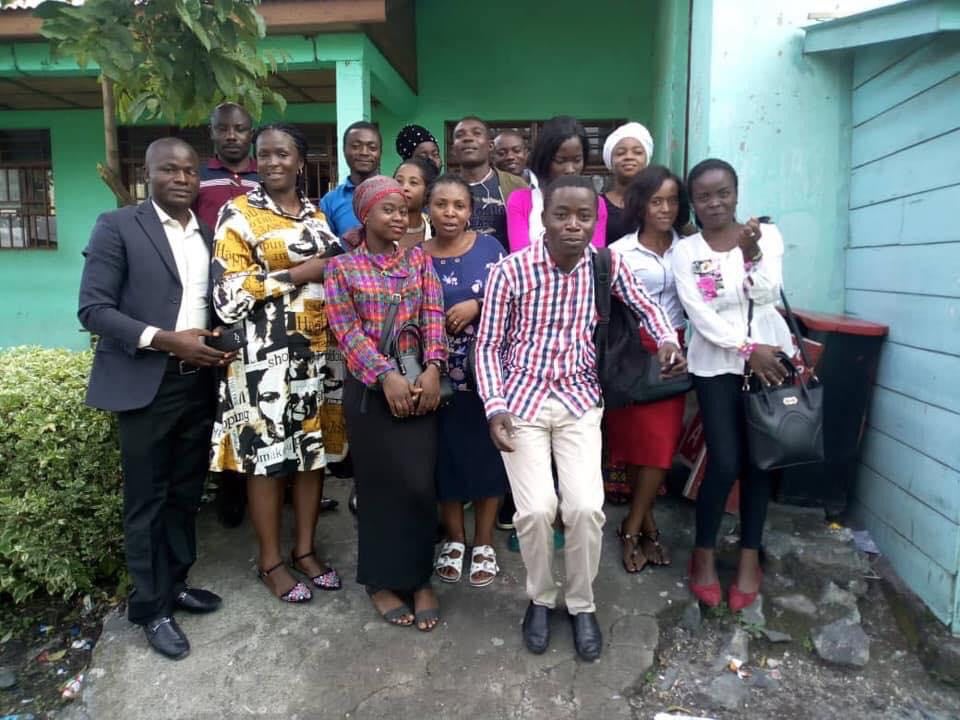
SELF-HELP AND RESILIENCE IN THE DEMOCRATIC REPUBLIC OF CONGO
I interviewed Bertin Kalimbiro from the Democratic Republic of Congo about his work in the Goma region to grow food safely and help people threatened
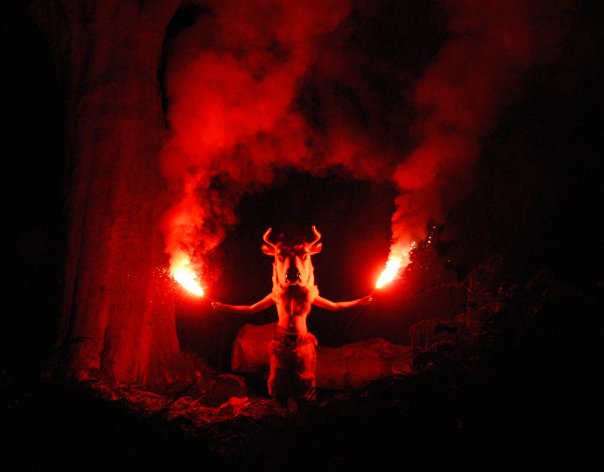
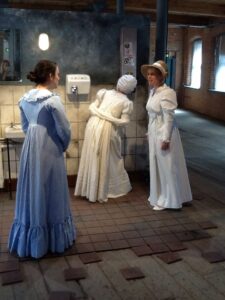
I interviewed radical actor, playwright and director Polly Wiseman about her work with her company Fireraisers that produces ‘extraordinary theatre in unexpected places’. Polly uses equal numbers of female and male actors, with the women playing central roles, and often stages her plays in the ‘real world’ at venues suited to the subject matter – for instance in bars, galleries and cinemas. Polly’s work is also multi-media and cross-genre involving live music and choirs, film, sculpture, verbatim accounts and direct audience address.
Leslie: What first led you to choose a career in theatre? How did it begin, grow and develop?
Polly: I knew I wanted to be an actor at age five. Seeing the Wizard of Oz in the village hall, I burst in to tears when it was over, because I wanted to live in the magical world on stage, rather than the real world! When I was about ten, I started to write plays that I would coerce my sister and best friend to perform in my parent’s living room (I was always the star, obvs) Then at eighteen, I went to the Royal Academy of Dramatic Art. Whilst I was there, I realised the parts for women were mostly rubbish – so at nineteen, I set up a theatre company that would employ at least as many women as men and in equal roles. Realising there weren’t many suitable scripts, I began to write my own. I was invited to join the Royal Court Young Writers programme, then was one of Soho Theatre’s Young Writers, and they produced my play, Bright, which got me an agent, and I’ve carried on as a writer and artistic director of Fireraisers, also performing and directing. Fireraisers had been on hiatus for four years as I worked on commissions for Eastern Angles, Theatre Royal Margate and Home Mcr. It was a real luxury to only have to worry about the writing, with other people making the show happen – but I realised I missed running a company. So I relaunched Fireraisers last summer, with scratch performances of Femme Fatale at Latitude festival and Wilton’s Music Hall. We’ve just been awarded ACE funding to do a mini tour of the South East and then a three week London run.
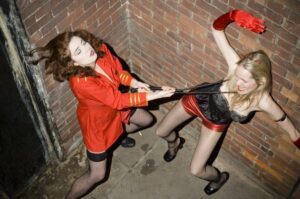
Leslie: What were the most important lessons you learned from your training?
Polly: The practical skills taught at RADA are bar none: how to be heard, how to move on stage, how to inhabit a character. I’m so grateful for these, plus the exposure to many kinds of play and fantastic directors. In terms of acting…I think you can either do it or you can’t. I found the Stanislavski method, with its insistence on being truthful, wearying. Acting is lying. You just have to figure out how to do it entertainingly.
The biggest lesson I learnt was that if I didn’t create opportunities for myself, nobody else would. Great parts for women are few in the traditional cannon and theatres are STILL unwilling to commission or produce work by women, starring women, directed by women. The tide is slowly turning – but by God, it’s taking much too long! In the meantime, we have to keep creating work for ourselves and our female colleagues. And speaking out about male privilege and abuse and supporting other women who do.
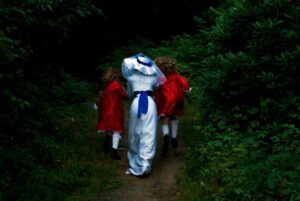
Leslie: Can you describe the similarities/differences, please, between your own original plays, written and directed with Fireraisers, and your commissioned work?
Polly: Fireraisers has a remit to produce ‘extraordinary theatre in unexpected places’ – so my shows for the company are usually site-specific or site-generic. The work springs from a setting: e.g, woodlands, Selfridges shop window, an oilrig moored off Brighton beach… which suggests a story and characters.
Commissioned work tends to start with a theme or subject that the company wants me to tackle. Much of it has been historically-based. Topics I’ve covered have included racism in WW2, Victorian theatre, The Peterloo Massacre and 1980s Rave culture in Manchester and currently a show for RADA festival, Warlords & Tyrants in which the Match Women’s strike of 1888 collides with misogynist trolls on Twitter. (I see no reason to write a historically-set show unless it has something to say about today and I love time travel!)
Any show I make will have at least as many parts for women as men and they’ll be central characters, not girlfriend/ wife/ mother of. I’m primarily interested in outsider women who refuse to play by the rules.
Leslie: How do you approach a commission?

Polly: I’ll have agreed a theme with the company, along with how many actors I can have and where the show will happen.
If the show is based in history, my process will start with research. I try to work from first-hand sources: people’s actual words, rather than newspaper reports or historian’s views. Real people are weirder than you imagine and their concerns are personal and specific, which is what you need for drama. As well as visiting libraries, museums and archives, I’ll have a whole shelf of books and lots of saved links on my computer. Usually an idea will leap out early on and become the heart of the show. Somewhere In England, my show for Eastern Angles, for instance, was specifically commissioned to tell the stories of black troops in the Suffolk area. It quickly became clear to me that the locals were friendly until the GIs started going out with their daughters and sisters. An interracial romance therefore became the catalyst for the action. Once the main story is in place, subplots need to be found to illuminate other aspects of the subject – maybe the wider political situation – but the thing that grabs me emotionally first off is probably going to stay at the centre. After a certain point, you have to put the research aside and tell a compelling story featuring strong characters with high hopes and lots to lose.
Leslie: How has feminism (and what kind of feminism) inspired your creative work?
Polly: I never really read feminist literature as a teenager and I didn’t realise I’d be treated differently from a man at work. Setting up a company at age 19 and being ignored in favour of the men in the room was a wake-up call. It made me determined to make my voice heard and keep putting women’s stories centre stage. (Come to think of it, my mum did give me Maya Angelou’s I Know Why The Caged Bird Sings and Margaret Atwood’s The Handmaid’s Tale to read as a kid: maybe they were meant to be warnings!)
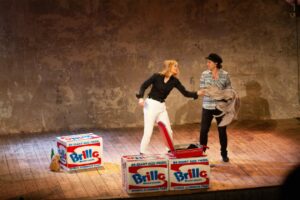
Much of my professional inspiration comes from the women I’ve worked with. I grew up idolising Linda Marlowe: now, I’m lucky to count her as a friend and she’s in the reading of my Warlords & Tyrants. Her career has been inspiring: from punk band, to movies, to originating roles for Steven Berkoff, to Eastenders to her solo shows: she lives by her own rules.
Lisa Goldman, the ex-artistic director of Soho Theatre, was a champion of my early work and I owe her the start of my writing career. I’m very lucky that she’s still a friend and mentor today.
Lately, it’s been fantastic to see the creation of Era 50:50, Ideas Spark, Houselights and Bossy: and the support networks they’ve created for womxn in our profession.
In recent years, I have read some feminist literature: radical feminist Valerie Solanas is the subject of Femme Fatale. I can recommend her SCUM Manifesto (The Society For Cutting Up Men), for a satirical – yet painfully true – assessment of what needs to change to achieve equality. Published in 1968, it’s still entirely relevant, annoyingly!
Leslie: How do you avoid didacticism in your political theatre?
Polly: Creating complex characters with flaws helps to stop them being political mouthpieces. And I try to always bear in mind that old adage, ‘show, don’t tell’: write a situation that reveals the problem rather than having a character rant about it. In general, women’s stories have been neglected, as have those of people of colour and the LGBTQ community– so writing them at all is a political act and you can use a pretty light touch. Comedy is crucial, in my book! If it’s a desperate situation, make it funny: people are more likely to listen.
Leslie: Tell us about your new production. How has it adapted techniques/approaches you’ve used before and how does it break new ground?
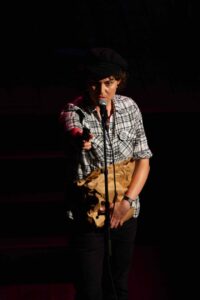
Polly: The current show I’m writing, Femme Fatale, is my first cabaret-play (involving live music, film and direct audience address) and we chose venues suited to the subject matter: bars, galleries and cinemas. I worked in a night club for some years and wrote and acted in cabaret shows, which gave me more confidence about direct audience address and performing in less than quiet (and potentially heckler-filled) settings! Now I’m combining that experience with my ‘straight’ playwrighting skills. I want to see if we can engage a non-traditional theatre audience with a feminist show: make the subject matter fun, as well as empowering.
Leslie: Why did you move into directing from being an actor?
Polly: Right from my childhood living room shows, I guess I’ve always directed. From quite early on, Joan Littlewood and Lillian Baylis were my role models: the idea of being an actress-manageress. When I graduated from drama school, Fireraisers produced ‘Andy & Edie’, for the Brighton Festival. I had a strong idea of what the show should look like: we’d use physical theatre and film to bring a 60s pop-art world to life. And two of us would play twenty-or- so (real) characters. It never occurred to me that I couldn’t bring it off – the arrogance of youth…! So I basically made directing up as I went along. The show sold out, went to Edinburgh, got ACE funding, did a National tour and was nominated for a Total Theatre Award. I think a lot of its success was because we loved that world and those characters and our joy was infectious. You always need that. Skills can be learnt along the way. Now, I see my job description as, ‘I make theatre’, rather than that I’m specifically a writer, actor, director or producer.
Leslie: Who are the dramatists/performers you’ve been most influenced by – why them?
Polly: Linda Marlowe – her incredible physicality in performance and her bravery in running her career to her own specifications. Miranda Richardson – for her larger-than-life and eminently watchable characters. Punchdrunk – for creating a whole magical world for the audience to explore. Anthony Neilson – for his devastating morality stories (though I think he hates being called a moral writer) told in incredibly imaginative ways. Caryl Churchill – inimitable genius.
Recently, I loved Morgan Lloyd-Malcolm’s Emilia – it was fun and huge and necessary and it galvanised an entire audience to whooping, shrieking delight. In the West End! With three women of colour as the leads! There’s hope yet…
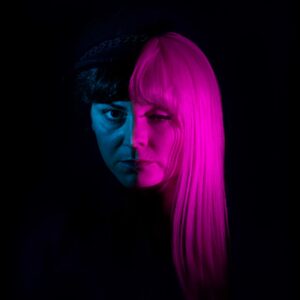
Other influences have been Andy Warhol for predicting – or possibly creating – late 20th and early 21st century pop culture, female rockers Nico (ex Velvet Underground and the other character in Femme Fatale, for her pioneering solo work as a Goth legend), Patti Smith for her searing words, righteous fervour and stage presence, and the amazing cabaret performers I’ve met over the years: Fancy Chance, Gateau Chocolat, Dickie Beau, Sarah Louise Young, Dusty Limits, Luci Fire…and many more.. Their style, verve, courage and imagination (not to mention their ability to display these qualities whilst eating fire, singing opera, hanging from the ceiling by their hair) has astonished and delighted me.
Leslie: What’s your style and creative aim as a director?
Polly: To mix things up and create something new. Lillian Baylis’s motto, “Dare, always dare!” is my favourite: I love a challenge. Last year, I wrote and directed a piece called Damage Control for Playground Theatre which combined giant bronze sculptures by Josie Spencer with verbatim accounts of London disasters from The Great Fire to Grenfell and a forty-strong choir. The constant is that I always centre shows on women’s experiences and the settings tend not to be domestic: they portray women at work and amid world events.
Actors have told me they’ve been surprised I take their suggestions on board. That flabbergasts me. Are there really directors with such huge egos that they won’t consider an idea that makes their show better?! I love to work collaboratively. To me, that’s what theatre’s about.
Next week I interview theatre producer Matthew Schmolle, who specialises in producing and staging co-created community performance, new writing, street theatre and agitprop.
ABOUT LESLIE TATE’S BOOKS:

I interviewed Bertin Kalimbiro from the Democratic Republic of Congo about his work in the Goma region to grow food safely and help people threatened

I interviewed computer expert and sustainability campaigner Dr Erlijn van Genuchten, who writes easy-to-understand books based on science full of practical suggestions for planet-friendly living.

I interviewed Canadian cartoonist Dawn Mockler about how she works on cartoons that might be environmental or wordless but always witty – especially her famous
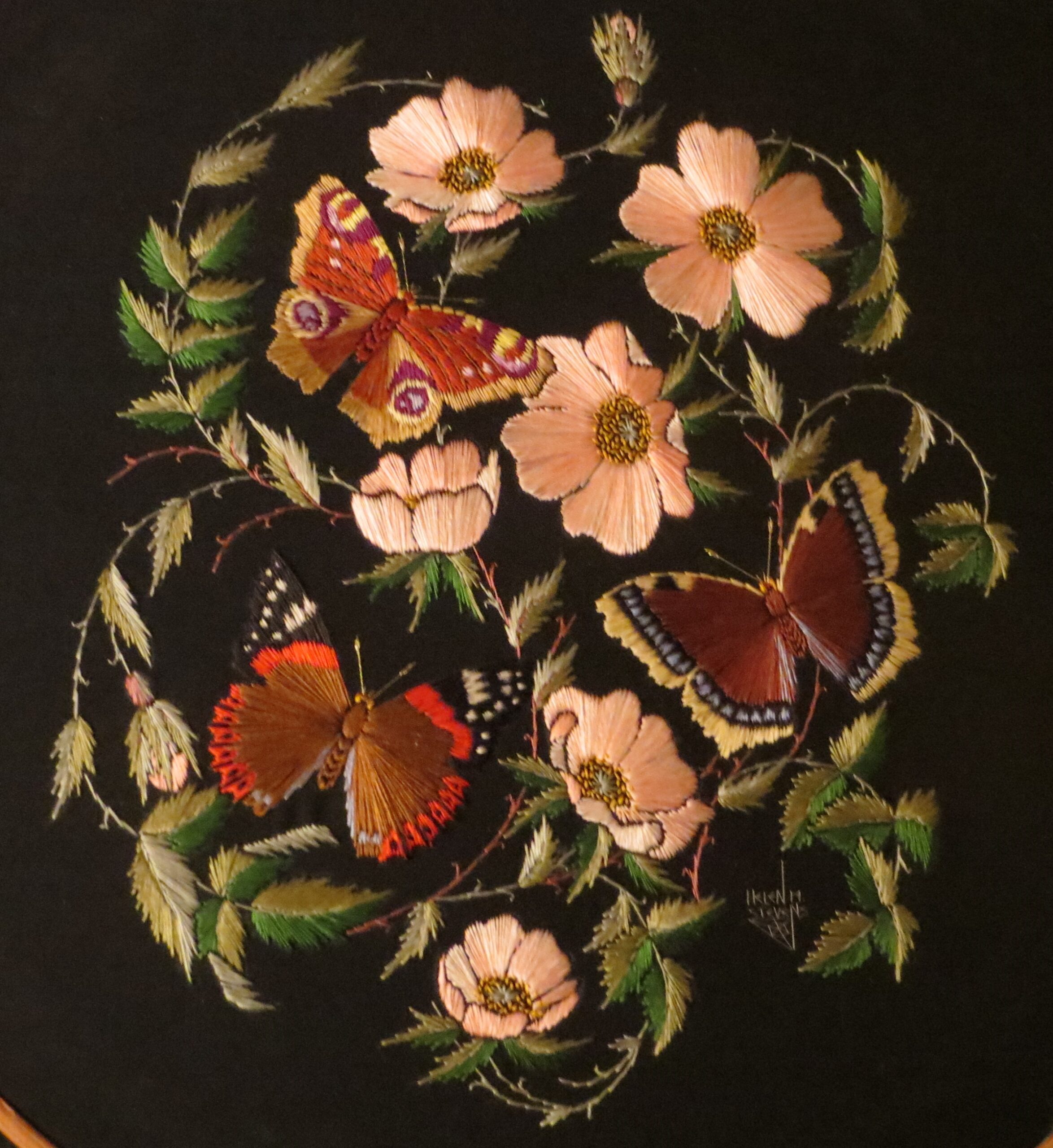
I inteviewed Helen M Stevens about how she has revived the art of embroidery, creating original contemporary patterns while studying and drawing on, “One of
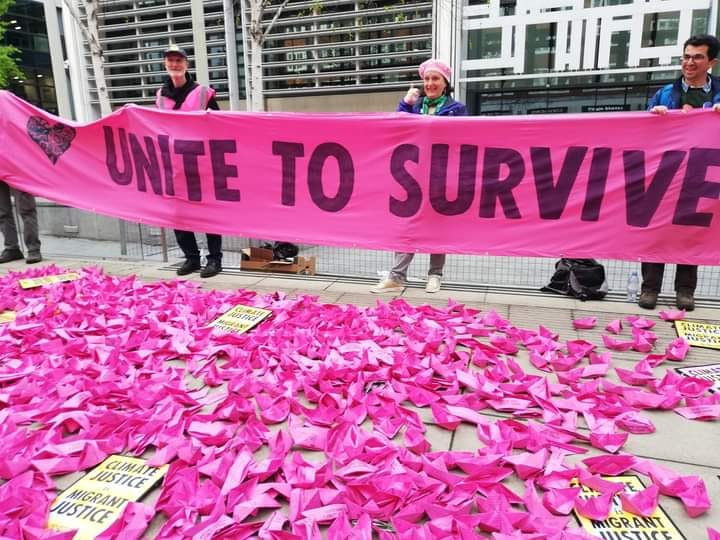
I interviewed Councillor Rachel Smith-Lyte about the origins of her passion for nature and her environmental activism. Rachel tells the story of her teaching (and
| Cookie | Duration | Description |
|---|---|---|
| cookielawinfo-checkbox-analytics | 11 months | This cookie is set by GDPR Cookie Consent plugin. The cookie is used to store the user consent for the cookies in the category "Analytics". |
| cookielawinfo-checkbox-functional | 11 months | The cookie is set by GDPR cookie consent to record the user consent for the cookies in the category "Functional". |
| cookielawinfo-checkbox-necessary | 11 months | This cookie is set by GDPR Cookie Consent plugin. The cookies is used to store the user consent for the cookies in the category "Necessary". |
| cookielawinfo-checkbox-others | 11 months | This cookie is set by GDPR Cookie Consent plugin. The cookie is used to store the user consent for the cookies in the category "Other. |
| cookielawinfo-checkbox-performance | 11 months | This cookie is set by GDPR Cookie Consent plugin. The cookie is used to store the user consent for the cookies in the category "Performance". |
| viewed_cookie_policy | 11 months | The cookie is set by the GDPR Cookie Consent plugin and is used to store whether or not user has consented to the use of cookies. It does not store any personal data. |